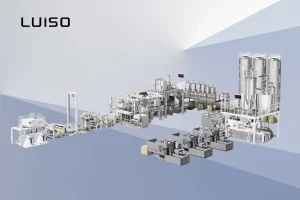In plastics processing plants, handling materials—whether pellets, regrind, finished parts or scrap—is a critical link between different stages of the production process. Poorly managed transport can lead to time loss, increased energy consumption, product contamination, and safety risks on the shop floor.
To meet these challenges, MB Conveyors develops modular in-plant conveying solutions tailored specifically to the plastics industry. From inclined conveyor belts and air-cooling systems to part separators and feeding hoppers, their equipment helps improve workflow, reduce costs, and optimize available space. In this article, we look at how to boost material transport efficiency with MB Conveyors systems, and why they are a smart choice for modern production lines.
Why optimizing internal transport is critical in plastics manufacturing
In injection molding, extrusion, or blow molding plants, materials pass through multiple stages: raw material feeding, transformation, cooling, quality control, separation, storage, and packaging. These steps are interconnected by conveying systems that must match production speed, product type, and facility layout.
Using inadequate conveying systems can lead to:
- Bottlenecks and delays.
- Unnecessary manual handling.
- Cross-contamination of materials.
- Operator safety hazards.
- Difficulties with cleaning and maintenance.
Therefore, investing in efficient, customizable material handling equipment has a direct impact not only on productivity, but also on product quality, traceability, and workplace safety.
MB Conveyors: specialized transport solutions for the plastics industry
MB Conveyors, an Italian company with over 30 years of experience, designs and manufactures internal conveying systems specifically for the plastics sector. Their modular, high-performance equipment enables companies of all sizes to streamline operations with tailor-made solutions.
What sets MB Conveyors apart?
- Fully customizable equipment in terms of size, shape, and functionality.
- 100% manufactured in Italy to European industrial standards.
- Perfect compatibility with injection, extrusion, and blow molding machines.
- Built for continuous 24/7 operation.
- Wear-resistant components and easy maintenance.
All MB Conveyors systems are CE-compliant and designed to operate in controlled environments where dust, temperature, and humidity are critical—conditions typical in thermoplastics processing.
Types of equipment and their impact on operational efficiency
Let’s explore MB Conveyors’ most commonly used machines and how each contributes to a more agile and efficient production line:
Modular conveyor belts (CV, CNC, PL)
MB’s conveyors are built with anodized aluminum or painted steel frames and are available with smooth, rough, or modular belts depending on the product being handled.
Benefits:
- Adjustable in length, height, and shape (straight, curved, Z or L-shaped).
- Quiet, low-consumption motors.
- Variable speed control via frequency inverter.
- Models available for product infeed or outfeed.
These conveyors automate the transfer of parts from machines to inspection, cooling, storage or packaging stations—reducing the need for manual intervention.
Air-cooled conveyors (CA series)
In injection or extrusion processes, many parts require gradual cooling before they can be safely handled or packed. MB’s CA conveyors feature integrated ventilation systems that reduce product temperature without adding moisture.
Advantages:
- Prevents deformation caused by residual heat.
- Accelerates production cycles.
- Improves operator and product safety.
Ideal for thin-walled components or materials sensitive to thermal shock.
Part separators (DS, SG, RSP)
MB offers automated part separation systems that divide usable products from runners, sprues, or flash directly at the conveyor output.
Operational benefits:
- Reduces manual sorting.
- Increases productivity and accuracy.
- Facilitates regrind recovery and waste reduction.
Depending on the model, these systems use sieving, vibration, rollers, or adjustable screens to sort parts by size or geometry.
Feeding and accumulation hoppers (HOP series)
Hoppers allow for temporary product storage and controlled feeding into downstream packaging, weighing, or inspection stations.
Advantages:
- Automatic fill-level management.
- Stable, controlled flow into machinery.
- Fewer line stops due to material shortage.
When combined with conveyors, hoppers help maintain a continuous and balanced production flow.
What improvements come from implementing MB Conveyors?
Integrating MB Conveyors systems into a plastics processing line delivers measurable improvements in several key areas:
Operational efficiency
- Higher throughput with fewer disruptions.
- Shorter idle times due to faster material handling.
Product quality
- Prevents contamination and part damage.
- Maintains full traceability of production flow.
Safety and ergonomics
- Less physical strain on operators.
- Eliminates unnecessary manual movement of materials.
Flexibility
- Modular design fits future plant upgrades.
- Easily adjustable to various part sizes or material types.
Seamless integration with injection, extrusion, or blow molding lines
A major strength of MB Conveyors is their direct compatibility with leading plastics processing equipment. This enables:
- Conveyor systems to be installed alongside molding machines from day one.
- No need for complex custom frameworks or adaptations.
- Centralized control via the main machine interface.
Thanks to their robust design, MB Conveyors can run unattended and connect to central automation systems as part of a larger smart factory setup.
Luiso: technical advice and custom integration
Material transport inside a plastics processing plant isn’t just a logistical detail—it has a direct impact on productivity, quality, and operational cost. With MB Conveyors’ modular systems, each stage of product flow—from machine output to warehouse—is optimized for speed, precision, and cleanliness.
In partnership with Luiso, your facility can benefit from reliable, efficient, and tailor-made conveying solutions, backed by experienced professionals.
At Luiso, as specialists in plastics processing engineering, we work closely with MB Conveyors to design customized internal transport solutions. We assess each client’s specific needs and recommend configurations that boost efficiency and reduce operational costs.
Our services include:
- Technical assessment of plant layout.
- Custom system design and integration planning.
- Installation and operator training.
- Spare parts and after-sales support.
We can also integrate MB Conveyors with blow molding, injection molding, or auxiliary equipment from other manufacturers, ensuring a fully coordinated and efficient system.
If you’re planning to improve your internal material flow or need a specific solution for handling plastic parts, contact Luiso. We’ll help you design a transport system that boosts efficiency and supports your production growth.




